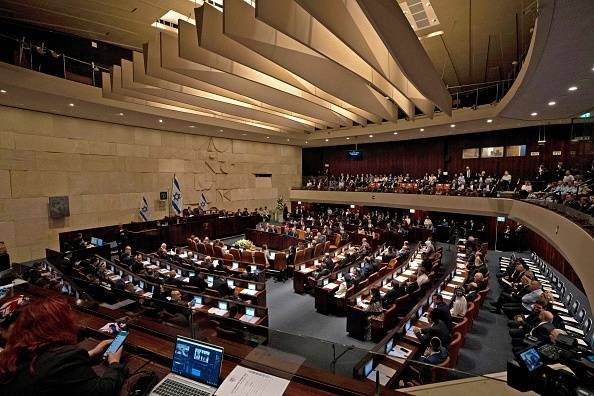The Israeli Knesset passed the controversial "Reasonability" law today, Monday, with a majority of 64 votes in favor and no opposition votes. All members of the ruling coalition voted for the law, which aims to strip the Supreme Court of its authority to declare government decisions as "unreasonable." Meanwhile, all opposition members left the Knesset chamber during the voice vote.
Israeli lawmakers concluded their marathon discussion on the "Reasonability" bill and moved on to what is known as the "second reading," a series of votes on amendments introduced by lawmakers in an attempt to delay the final passage of the bill.
In a press conference, Prime Minister Benjamin Netanyahu stated: "We hope that the ruling coalition of religious and nationalist parties will reach an agreement with the opposition on the controversial judicial amendments plan by the end of November." He urged reserve soldiers to prioritize the interests and security of citizens above politics, asserting that the Supreme Court would remain independent. He also asked the Ministry of Defense to stay out of political disputes, as Defense Minister Yoav Galant threatened that all judicial amendments approved during Netanyahu's tenure would be erased with a single stroke of a pen later.
He continued, "We respect minority rights, but respect must prevail among all." He indicated that the coalition had worked in every possible way to reach an understanding that satisfies everyone.
Earlier on Monday, Prime Minister Netanyahu arrived at the Knesset shortly after being discharged from the hospital, where he underwent a heart pacemaker implant last weekend, according to images from the Knesset.
Israeli police announced the arrest of at least 12 protesters outside the Knesset coinciding with the second reading of the bill.
White House spokesperson Karine Jean-Pierre stated that President Joe Biden would continue to push for a broad consensus among Israeli politicians regarding Netanyahu's judicial amendment plan after the Knesset passed the first law of it. She added, "Biden has not given up on his goal of achieving broad consensus following the collapse of last-minute efforts for a settlement, which failed to quell a constitutional crisis that has persisted in the country for months."
The National Security Council spokesperson noted that the Biden administration considers the Knesset's approval of a clause in Netanyahu's judicial amendment plan as "unfortunate." The official stated, "We believe you need to work toward consensus for significant democratic changes... We urge Israeli leaders to work towards a consensual approach through political dialogue."
Protesters surrounded the Knesset from early morning, armed and sitting in the streets to express their opposition to the bill. The bill represents the first part of a multi-faceted government plan to weaken judicial authority. Netanyahu and his allies argue, according to CNN, that it is necessary to rebalance power between a highly empowered court and an elected government, while opponents assert that it removes one of the few checks on government power in a country without a written constitution.
The plan has generated threats from reserve military soldiers to cease volunteering for service if the bill is passed, and the Israeli Bar Association is already preparing to challenge it in court.
The group "Movement for Quality Government in Israel," which plays a monitoring role, announced it would submit a petition to the Supreme Court against the newly amended law that limits the court's authority to review government decisions. They added, "The amendment, introduced by the religious-nationalist coalition and approved today, effectively cancels the judiciary, and the court must annul it."
The main trade union in Israel revealed it would meet with other union officials to discuss the possibility of declaring a general strike following the Knesset's approval of the key bill in the controversial judicial amendment plan. Arnon Bar David, the union head (Histadrut), attempted to mediate between the government and the opposition to reach a consensus. He stated that the disputes are simple, but mediation efforts have failed due to political whims.
Bar David said, "From this moment forward, any unilateral advancement of the amendment (judicial) will have dire consequences... Things can either move forward with broad agreement or not at all." He mentioned he would meet with Histadrut officials to declare a "general labor dispute" and would "activate it if necessary until a complete shutdown (of the economy) is achieved."
Following the approval of the amendment today, the Tel Aviv Stock Exchange dropped by 1.6%, and the shekel fell by 0.3% against the dollar. The police used water cannons to disperse protesters opposing Netanyahu's national-religious coalition, while officers removed protesters who had chained themselves and blocked access to the parliament.
Opposition leader Yair Lapid told Israeli television channels in the Knesset moments before the vote, "You cannot reach agreements that protect democracy in Israel with this government."
As banks and companies joined the protests, pressure mounted on Netanyahu, who left the hospital this morning after a two-night stay during which a pacemaker was implanted. Washington has urged Netanyahu to reach a consensus on any judicial amendments, while his hardline coalition partners pressured him to advance the amendment, potentially followed by further judicial changes.
The crisis has extended to the military, with protest leaders stating that thousands of reserve volunteers have threatened not to serve if the government proceeds with its plans, while senior former officers warned that Israel's readiness for war could be at risk.
Before the vote, Lapid told lawmakers in a stormy discussion, "We are heading toward catastrophe... If this law is passed, it will weaken the State of Israel, the people of Israel, and the Israel Defense Forces."
This would represent a first step within a package of legal amendments that critics fear aim to limit judicial independence. However, Netanyahu, who is on trial for corruption charges he denies, insists on their importance to balance the powers of governance. Justice Minister Yariv Levin, who leads the amendment process, defended the bill, which will modify a law enabling the Supreme Court to nullify decisions it deems "lacking reasonability." He said, "There is no reason to fear these amendments. There are many reasons to see them as an important step towards restoring balance among the governing branches in terms of respecting voter choice."
He added, "We have taken the first step in this important historical process of reforming the judiciary and regaining the powers taken from the government and the Knesset (parliament)." Netanyahu's coalition had resolved to resist what it describes as overreach by the Supreme Court, which it claims is excessively interfering in politics.
Critics argue that the amendment passed today was rushed through the Knesset and will open the door to abuses of power by eliminating one of the few effective checks on the executive power in a country without a formally written constitution.
The government announced plans to introduce judicial amendments in January shortly after taking the oath of office, leading to unprecedented street protests and raising concerns among foreign allies regarding the safety of democracy in Israel, as well as harming the economy.
Israel's two largest banks, Leumi and Hapoalim, stated they would allow their employees to protest today without deducting from their salaries. About 150 of Israel's largest companies joined the strike, and two major shopping centers, Azrieli and Big, announced their stores would remain closed.




